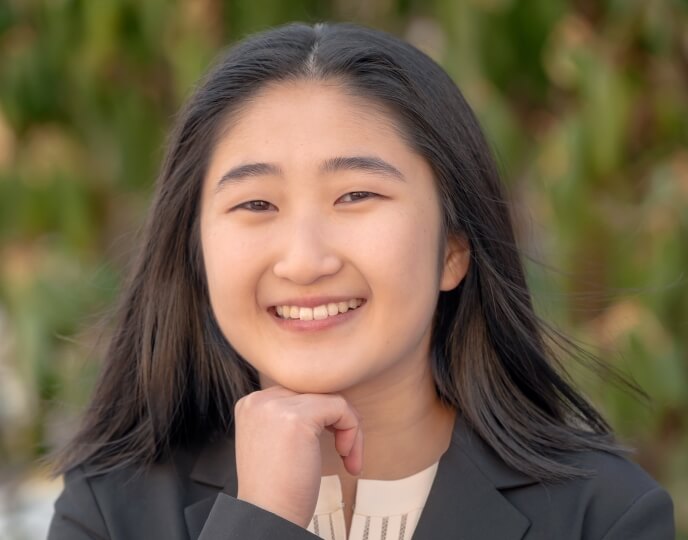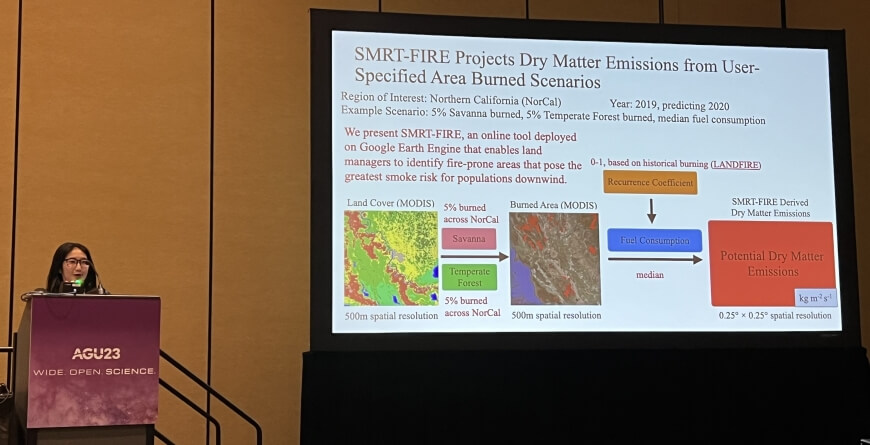Karina Chung, A.B. '26
Long before she came to Harvard, Karina Chung, A.B. '26, took an interest in climate change and the environment. She also loved computer programming and data science, and believed those technical skills could make an impact in addressing climate change.
“We’ve seen billions of dollars in damage due to climate disasters, and we see a wide variety of different impacts, such as hurricanes and worsening wildfires,” said Chung. “I wanted to understand the nuances of these problems: how difficult they are, what makes them difficult, and how I can use my skill set to address them.”
Chung has been doing exactly that as a computer science and statistics concentrator at the Harvard John A. Paulson School of Engineering and Applied Sciences (SEAS). In the summer after her first year, Chung joined the Atmospheric Chemistry Modeling Group subgroup of Loretta Mickley, Senior Research Fellow in Chemistry-Climate Interactions at SEAS. Her project was to help develop SMRT-FLAMES (“Smoke Management and Risk Tool with Fire-Land-Atmosphere Mapped Scenarios”), a new wildfire management software application that could advise on the potential risk of smoke exposure as land managers plan out controlled burns ahead of the start of wildfire season.
“The tool’s audience is professional wildfire managers, such as folks who work in the United States Forest Service, or the California Department of Forestry and Fire Protection,” Chung said. “What we’ve learned from research is that in the 12 months after the fire season, there are still widespread, measurable impacts from the smoke on public health. It exacerbates chronic health and respiratory conditions. What we want to do with this tool is allow professional wildfire managers to incorporate smoke exposure as part of their calculus when deciding where to apply their fire prevention resources.”
Chung first presented the potential of the app at the American Geophysical Union annual meeting in December 2023, and continued working on it throughout her second and third years. She also co-authored her first paper on the app, which was recently published in Environmental Science & Technology.
“I’m grateful for Loretta and my mentors, Makoto Kelp and Tina Liu, because they were my rocks during this period,” Chung said. “They helped me put everything into perspective in terms of delivering an effective conference presentation, navigating the publication process, and working with collaborators and potential users of the tool. We received a lot of different input, and I think that really made this paper a lot stronger.”
Karina Chung presents her research at the 2023 American Geophysical Union meeting.
WHERE THERE’S FIRE, THERE’S SMOKE
Controlled burns and vegetation thinning are common methods used to reduce the severity of potential wildfires, and land management tools already existed when Chung began her work. But many of those tools focus primarily on reducing the damage from the fire, such as how many total acres burn, rather than the potential smoke exposure. Mickley’s lab has published multiple studies on the effects of wildfire smoke on human health, so building an app around mitigating smoke exposure perfectly incorporated Chung’s coding skills into the lab’s overall mission.
“The tool is for land managers to decide where they should target their limited resources in order to best reduce the impacts of wildfire smoke,” Chung said. “What I really liked about some of the climate research that’s going on at Harvard, including the specific product I worked on with wildfires, is that there’s a very clear focus on producing something that decision-makers and the public can actually use. You could do all this great research, but it doesn’t have much value unless we bring it to communities and decision-makers who can put it to use.”
GROWING THE CS COMMUNITY
When she’s not developing the app, Chung is actively engaged with the computer science community at SEAS. She first got involved with the Harvard Computer Society (HCS) as Co-Director of Professional Development, and at the start of 2025 became Co-President.
“There’s so much opportunity for Harvard students to get involved with projects that really do make a difference on the ground fairly quickly,” she said. “The CS student body is an amazing group of really talented individuals, and HCS is a really good place for me to not only be able to get to know the CS community and make friends, but also to showcase all the opportunities that are out there.”
As Co-President, Chung oversees HCS’s professional development programming, which provides club members with opportunities to explore potential career paths in CS. She also helps facilitate HCS’s academic and community programming, which seeks to foster a vibrant and inclusive CS community at Harvard.
Chung has helped support numerous affiliated initiatives, such as Tech for Social Good, the Responsible Computing Collective, and the Tech and Global Health Initiative.
“Our HCS subgroups and affiliates are incredible, student-run initiatives that folks have pitched to HCS leadership,” she said. “We’re continuing to explore how we can bring in students from a wide range of disciplines into the CS community, and our affiliate organizations are great vehicles for doing that.”
Chung has been part of several climate-related organizations since coming to Harvard, including being a research assistant at the Harvard Salata Institute for Climate and Sustainability and the Matthes Lab at Harvard Forest, as well as interning at Climate Engine, a climate tech startup. She’s also interested in finance, and last summer interned with The Lightsmith Group, a private equity firm that focuses on climate adaptation investments.
A New York City native, Chung is home this summer for an internship with Blackstone Data Science.
“My goal is to explore and get exposure to new opportunities,” she said. "The role of a data scientist is inherently interdisciplinary. You’re understanding business decisions, you’re doing technical work, and you’re the bridge between technical and non-technical teams. The great thing about this opportunity is that you sample a little bit of everything.”
Press Contact
Matt Goisman | mgoisman@g.harvard.edu

